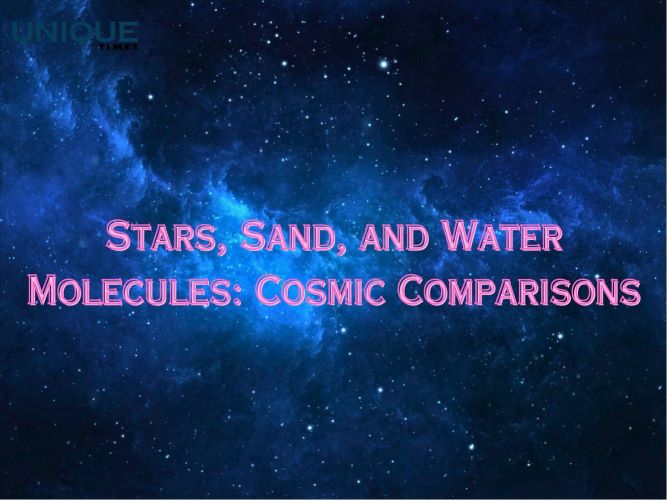Counting the Stars: A Universe of Cosmic Comparisons

The universe is a vast, awe-inspiring expanse that has fascinated humans for millennia. When we attempt to quantify its vastness, we encounter astonishing comparisons that challenge our understanding of scale. Did you know that there are more stars in the universe than grains of sand on Earth? Moreover, the number of water molecules in just ten drops of water equals the total number of stars in the known universe. In this blog post, we’ll delve into these mind-boggling cosmic comparisons and explore the wonders they reveal.
1. Stars Beyond Counting
Our galaxy, the Milky Way, is estimated to contain around 100 billion stars. And the observable universe? That’s where the numbers truly skyrocket. Astronomers estimate there are at least 100 billion galaxies in the observable universe, each containing billions of stars. When we do the math, it becomes clear that there are more stars in the cosmos than there are grains of sand on every beach, desert, and coastline on Earth.
2. Grains of Sand vs. Stars
To comprehend this comparison, imagine walking along a sandy beach, picking up handfuls of sand and letting it slip through your fingers. With each handful, you’re holding more grains of sand than there are stars in the Milky Way. Now multiply that by the number of galaxies in the universe, and you begin to grasp the staggering number of stars out there.
3. Ten Drops of Water, Countless Stars
Now, let’s shift our focus from sand to water. Take just ten drops of water and consider this: the number of water molecules in those ten drops is equal to the total number of stars in the known universe. This incredible fact highlights the sheer enormity of the universe and the vastness of the cosmic landscape.
4. The Humbling Nature of the Cosmos
Contemplating these comparisons can be a humbling experience. They remind us of our place in the universe, which is but a tiny speck in the grand scheme of things. Yet, they also inspire wonder and curiosity about the mysteries that lie beyond our planet. The universe is a playground of celestial objects, cosmic phenomena, and untold wonders, waiting for us to explore and understand.
5. The Quest for Knowledge
Scientists, astronomers, and space enthusiasts continue to study the cosmos, unveiling its secrets one discovery at a time. With each new observation, we gain a deeper appreciation for the vastness and complexity of the universe.
6. Infinite Possibilities
The comparison of stars to grains of sand and water molecules reminds us that the universe is not only vast but also full of untapped potential. It’s a reminder that, in the vastness of the cosmos, there may be countless other planets with the potential for life, waiting to be discovered.
In conclusion, the universe’s size and scope are beyond human comprehension, but that doesn’t stop us from exploring, learning, and marveling at its beauty and complexity. As we gaze at the night sky and contemplate these cosmic comparisons, we are drawn into the infinite mysteries of the cosmos, reminding us of the boundless possibilities that await us in the universe beyond.
Picture Courtesy: Google/images are subject to copyright








